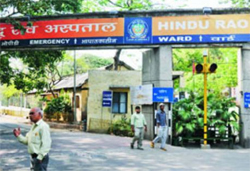
New Delhi, June 25: The severe water shortage in the city has begun to take a toll on urgent health services. At Bara Hindu Rao, the largest municipal hospital in the city, more than 40 surgeries were cancelled over the past week because water could not be arranged for the procedures.
Doctors at the hospital said there was no water to sterilize instruments, wash the operation theatre, clean the linen and wash hands - without which surgeries could not be conducted.
At other hospitals such as Deen Dayal Upadhyaya, Ambedkar and Safdarjung, patients said they were having to buy water from outside for most of their needs as hospital taps ran dry. Washing and cleaning, a vital function in hospitals to prevent infections, has mostly been abandoned at many institutions.
Toilets were stinking at a number of hospitals and doctors on night duty said they were having to carry their drinking water because there was no water in the wards.
At Bara Hindu Rao, the worst days were Monday and Tuesday. "We had to reschedule some routine surgeries but emergency services were not affected. We called in water tankers to manage the problem. The supply has been restored now," said Dr Ravi Gupta, additional medical superintendent of Bara Hindu Rao Hospital.
A senior gynaecologist at the hospital said 10 surgeries in the department were cancelled on Monday and Tuesday. "The patients were asked to come later," she said.
Another doctor added, "As it is, the waiting period for operations in departments such as urology, surgery and orthopedics has gone up because the main OT has been partially closed since January for repairs. The water crisis will aggravate the problem."
Doctors said they are giving preference to emergency cases and to outstation patients. Sources said Bara Hindu Rao witnesses water crisis every year during the peak summer, but this time the shortage was more acute because of the Wazirabad water treatment plant not receiving its quota of raw water from Haryana. "The government and hospital authorities should make arrangements for uninterrupted supply," a doctor said.
Dr Promila Gupta, medical superintendent at Deen Dayal Upadhyaya hospital, said the hospital has been facing water problems for more than a month. "No emergency services have been affected. But yes there is a problem," Gupta said.
A resident doctor at Safdarjung hospital said doctors were having to carry their drinking water during night duty. "There is no facility of clean drinking water in the wards and patients have to buy water from outside," he said.
At the 64-bedded B R Sur homeopathic medical college and hospital in south Delhi's Moti Bagh, patients said water supply to the toilets was irregular. Hospital authorities said they are managing the daily needs through tankers.
The Delhi Jal Board attributes the severe shortage in the city to curtailment of raw water supply by Haryana to the Haiderpur and Wazirabad treatment plants.





Comments
Add new comment